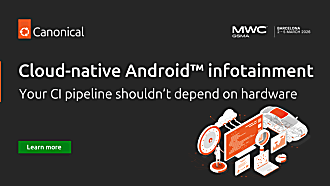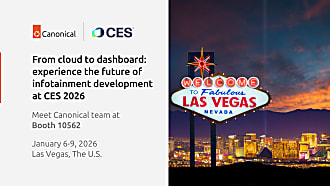Bertrand Boisseau
on 20 March 2023
Automotive consortiums: Setting new standards for safety and cybersecurity
Canonical strongly believes that the future of automotive will rely on open source to define and run the next generation of vehicles. To drive this transition, state-of-the-art cybersecurity and functional safety are critical. To learn more about the industry’s specific constraints, we are actively involved in several automotive consortiums and are contributing to automotive-related standards.

Joining consortiums enables us to access industry expertise from multiple companies facing different challenges, ensuring Canonical stays informed of the latest trends and best practices.
Being an open source company, we are also convinced that innovation and success come from strong collaboration. Participating in industry groups can generate partnerships, shared R&D projects and is beneficial for all parties involved.
While being a relatively new member of this automotive family, we also come with different views on how software should work and different best practices. With our contribution to consortiums and standardisation committees, we trust we can help shape the future of automotive by putting forth new ideas and helping consortium members streamline their operations.
In this blog post, we will detail our involvement in several of these consortiums and work groups and explain what each consortium represents.
Automotive Industry Standards
ISO 26262
By representing Canonical in the AUE/32 committee, we are contributing to ISO 26262 work groups via the British Standards Institute (BSI). ISO 26262 is an international standard that defines the functional safety (FuSa) standards and ASIL (Automotive Safety Integrity Level) compliance requirements for the automotive industry.
By doing so, we contribute to the development of FuSa standards and ensure that not only our solutions but open source software in general, can meet safety requirements.
As our vehicles become more connected and software-defined, it is critical that systems in cars ensure the safety of their occupants and surroundings. With Linux taking a bigger place in vehicles every day, it became critical for us to contribute to ISO 26262 and to understand how our products could meet regulatory requirements while keeping their competitive advantages.
As the industry and the standard continue to evolve, Canonical will be in a key position to learn and grow its functional safety knowledge while making sure that its portfolio of products matches strict safety expectations.
ISO 21434
The AUE/32 committee also contributes to the ISO 21434 standard, which provides recommendations allowing OEMs, suppliers and editors to ensure the cybersecurity of vehicles throughout their whole lifecycle.
With cars becoming more connected and autonomous, the risks of cyberattacks have increased these past years. At Canonical, we consider ourselves responsible for providing trustworthy and secure open source software, therefore, we recognize how important it is to contribute to cybersecurity standards like ISO 21434.
With the UN155 and UN156 regulations, cybersecurity measures in future vehicles’ systems will be enforced. The automotive industry will have to rely on secure software solutions, and the ISO 21434 standard will be valuable for OEMs to identify relevant software ensuring their vehicles are secure.

Automotive Consortiums
Eclipse SDV
Eclipse SDV focuses on how open source software can drive software development in the automotive industry and more specifically for the software-defined vehicle. Canonical has recently joined Eclipse SDV as a supporting member.
As an open source company, it was important for us to contribute to this group of industry experts that is working on defining and promoting open standards in automotive. Our involvement in this consortium is an important step in ensuring that we can provide the best possible solutions for the automotive industry.
By leveraging open standards, Eclipse SDV not only promotes open source software but also helps automotive companies build on top of existing solutions, hence decreasing time-to-market.
SOAFEE
Canonical has also joined SOAFEE and has actively been participating in technical steering committees. SOAFEE is focusing on pushing cloud-native standards as well as open source software in the automotive industry.
With Ubuntu being the world’s most popular operating system on public clouds, and our Kubernetes expertise, we can bring new solutions to the table.
Cloud computing architectures and cluster deployment approaches will play a big role in the future of software-defined vehicles. Being part of SOAFEE helps share best practices and offers opportunities to collaborate on the development of future standards and tools.
MIH (Mobility in Harmony)
Canonical is a member of MIH, a consortium founded by Foxconn focusing on in-vehicle infotainment systems as well as ADAS systems. MIH works on software and technical solutions related to sustainable mobility, focusing on the electric vehicles themselves, but also on charging infrastructure and mobility services.
This membership allows us to be a part of the conversation and contribute to the development of solutions that will shape the future of the automotive industry. Participating in the discussions on data analytics and cloud based solutions, Canonical can help MIH members reduce their development costs and time-to-market by using pre-built software components and open source frameworks.
Canonical is also taking sustainability challenges very seriously. We believe that our products can also benefit EV solutions like battery management systems, charging infrastructures and mobility services. By joining these workgroups, we will also learn more about the challenges sustainability experts are facing.
Summary
By being involved in key consortiums and contributing to functional safety standards, we help shape the future of software in the automotive industry. We are also heavily investing in hiring the best talent that will help us get there, and are committed to providing the best innovation and most reliable open source software solutions to automotive while keeping them competitive.
As a company, we are dedicated to the automotive industry and are actively committed to adapting our products to the sector’s specific needs, whether they are safety related or cybersecurity related.
As Ubuntu and open source take an ever-increasing place in the industry, we will continue to ensure our products meet the standards required to enable the next generation of vehicles. We are also committed to excellence and quality in meeting those standards.
Stay tuned to learn more about our upcoming involvement in automotive consortiums and standards.

To learn more about Canonical and our engagement in automotive:



